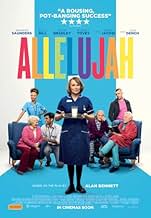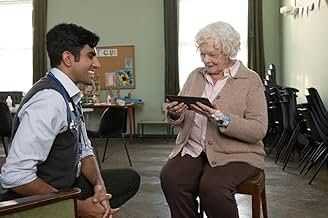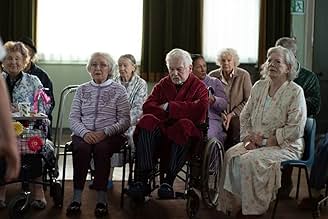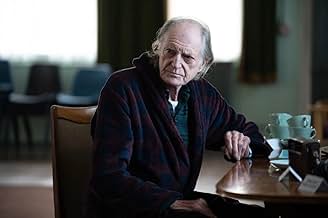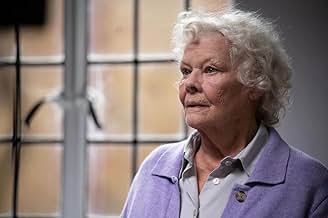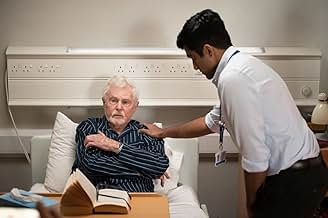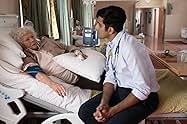Ajouter une intrigue dans votre langueThe story of a geriatric ward in a small Yorkshire hospital threatened with closure.The story of a geriatric ward in a small Yorkshire hospital threatened with closure.The story of a geriatric ward in a small Yorkshire hospital threatened with closure.
- Director
- Writers
- Stars
Avis en vedette
Do not get me wrong, the movie has funny bits and pieces, but I do not believe it is meant to be a funny movie. It is more a harsh reflection on healthcare and how we treat our elderly. But for me it did not get too dark, I also enjoyed it very much.
Jennifer Saunders really has grown as an actress I think. We know she can do funny, but in this more serious role she blossoms as well.
However, do you wanna watch because of dame Judy Dench, do not get your hopes up too much. She has a smaller part and for me a bit too small and on the side.
Overall, very well acted. If you are not English I recommend decent subtitles.
Jennifer Saunders really has grown as an actress I think. We know she can do funny, but in this more serious role she blossoms as well.
However, do you wanna watch because of dame Judy Dench, do not get your hopes up too much. She has a smaller part and for me a bit too small and on the side.
Overall, very well acted. If you are not English I recommend decent subtitles.
This is a bleak drama, intermittently comic, set in the geriatric ward of an old hospital in Yorkshire which looks and feels like the one where I had my appendix removed in the 1950s.
Jennifer Saunders is the ward sister, efficiently and briskly coping with everything from assisted showers to incontinence and patient deaths. Judi Dench and Derek Jacobi are among the patients, but the focus is mostly on Joe (David Bradley), a frail old gent hoping to be sent home, and his nerdy son Colin (Russell Tovey, the go-to actor for gay roles), who is on the team planning a new hospital.
The Alan Bennett pedigree guarantees brilliant writing and all the cast do eminent justice to the script, but the tone of the movie is unremittingly glum, largely focused on death and dementia, and the dimly lit hospital adds more gloom. The ending is a bit rushed and not entirely in tune with what's gone before.
This is a dark comedy that is perhaps a bit too dark. Our Mr. Bennett has not lost his touch, but the humor in ALLELUJAH is over-laced with bile and bitterness.
Jennifer Saunders is the ward sister, efficiently and briskly coping with everything from assisted showers to incontinence and patient deaths. Judi Dench and Derek Jacobi are among the patients, but the focus is mostly on Joe (David Bradley), a frail old gent hoping to be sent home, and his nerdy son Colin (Russell Tovey, the go-to actor for gay roles), who is on the team planning a new hospital.
The Alan Bennett pedigree guarantees brilliant writing and all the cast do eminent justice to the script, but the tone of the movie is unremittingly glum, largely focused on death and dementia, and the dimly lit hospital adds more gloom. The ending is a bit rushed and not entirely in tune with what's gone before.
This is a dark comedy that is perhaps a bit too dark. Our Mr. Bennett has not lost his touch, but the humor in ALLELUJAH is over-laced with bile and bitterness.
On the positive side, the acting was great. I particularly liked Jennifer Saunders' portrayal of a dedicated, no-nonsense ward sister, and David Bradley's retired miner. The underlying message of the threat to the NHS by those that don't understand its core values is an important one. But this film was not the way to make that point.
Although, as you'd expect with a strong cast, the acting was great, many of the characters were tediously stereotyped: the charming Asian doctor who 'loved old people', the bubbly, enthusiastic nurse, a range of old people who used Alan Bennett one-liners to establish themselves as sweetly eccentric, away with the fairies, or curmudgeonly in a loveable way. You could tell just by the body language that the children of an old lady were up to no good and just wanted to fleece her. The son of the miner who had gone South to forge a successful career as a management consultant was predictably transformed from an over-confident critic of the hospital to a supporter.
The setting was not so much stereotyped as confusing. The threatened hospital did have one doctor, one nurse, a sister, and a physiotherapist, and some of the patients were sick - indeed the plot hinged on a character who was worried that if he improved he'd be sent back to a nursing home. But most of the activities that we saw suggested that the institution was a care home - the old people seemed to be long-term residents and were well enough to shuffle around doing craft activities and reminiscence therapy. A film crew from the local paper were drifting around interviewing residents. It was as if the original intention was to make a film about a care home, but they then realised that if they wanted the message to be about the NHS, they needed to make it into a hospital.
I won't include spoilers but just to say that just when you think this is going to be a totally saccharine experience, where the struggling hospital will be saved from closure, there is a plot twist that acts like a hand grenade in derailing all expectations. It might have worked if the rest of the film had been more believable, but it seemed totally unsatisfactory in the context of the rest of the film.
And then, at the end we have bolted on a section where the nice doctor is now in a covid ward, making a heartfelt plea for the continuation of the NHS, while showing devastating scenes of patients in corridors, and exhausted staff in PPE struggling to cope. I found myself wishing that Ken Loach had made a film on this theme: that would have been far more effective than this clunky treatment.
Although, as you'd expect with a strong cast, the acting was great, many of the characters were tediously stereotyped: the charming Asian doctor who 'loved old people', the bubbly, enthusiastic nurse, a range of old people who used Alan Bennett one-liners to establish themselves as sweetly eccentric, away with the fairies, or curmudgeonly in a loveable way. You could tell just by the body language that the children of an old lady were up to no good and just wanted to fleece her. The son of the miner who had gone South to forge a successful career as a management consultant was predictably transformed from an over-confident critic of the hospital to a supporter.
The setting was not so much stereotyped as confusing. The threatened hospital did have one doctor, one nurse, a sister, and a physiotherapist, and some of the patients were sick - indeed the plot hinged on a character who was worried that if he improved he'd be sent back to a nursing home. But most of the activities that we saw suggested that the institution was a care home - the old people seemed to be long-term residents and were well enough to shuffle around doing craft activities and reminiscence therapy. A film crew from the local paper were drifting around interviewing residents. It was as if the original intention was to make a film about a care home, but they then realised that if they wanted the message to be about the NHS, they needed to make it into a hospital.
I won't include spoilers but just to say that just when you think this is going to be a totally saccharine experience, where the struggling hospital will be saved from closure, there is a plot twist that acts like a hand grenade in derailing all expectations. It might have worked if the rest of the film had been more believable, but it seemed totally unsatisfactory in the context of the rest of the film.
And then, at the end we have bolted on a section where the nice doctor is now in a covid ward, making a heartfelt plea for the continuation of the NHS, while showing devastating scenes of patients in corridors, and exhausted staff in PPE struggling to cope. I found myself wishing that Ken Loach had made a film on this theme: that would have been far more effective than this clunky treatment.
Maybe TIFF wasn't the best place to launch this very British film based on a play ?
The NHS ( National Health Service) is shown in a microcosm of political and cynical struggles in a small community hospital unit for old people needing special care.
It's very Alan Bennett, although with short but still cutting monologues , some are funnier than others but all serve a purpose.
The geriatric ward is the logical place to highlight the old and decrepit hospital system, fighting for survival at death's door, but there are more metaphors here, the NHS is killing people due to a lack of resources, most notably a shortage of beds, is there even a shortage of carers?.
Jennifer Saunders is great as the head nurse trying her best to keep a 'clean' ward, but working to targets for turnover of patients and moving them through the system comes at a heavy price, closure is imminent and her efficiency is not enough.
The doctor is stereotypical, an Asian immigrant with a nostalgic true vocational outlook to care for his patients with a hands on approach.
The patients are a who's who of British stalwart actors and they are very convincing as geriatrics, each representing the problems within the health care system. One patient's son happens to be a management consultant for the government's health minister and getting a personal experience of the hospital suggests the need for 'government' to understand the real world of this care in the community, rather than just facts and figures on spreadsheets, it's a political statement about how things are failing people by going for large scale centres of excellence?.
As a person with a lot of personal experience of the NHS and getting old too, I can relate to the representation if not actually recognise the geriatric care unit.
The film takes a risky turn or two near the end especially with a plea for support and understanding of the caring people who work in the NHS providing a public service, which is now underappreciated again post pandemic, although ironically with the recent strike action this has probably not helped their case.
This is bound to be a divisive film and some may be disappointed by it's change in tone from comedy to politics, especially if they don't understand the British system or the metaphors about it.
The NHS ( National Health Service) is shown in a microcosm of political and cynical struggles in a small community hospital unit for old people needing special care.
It's very Alan Bennett, although with short but still cutting monologues , some are funnier than others but all serve a purpose.
The geriatric ward is the logical place to highlight the old and decrepit hospital system, fighting for survival at death's door, but there are more metaphors here, the NHS is killing people due to a lack of resources, most notably a shortage of beds, is there even a shortage of carers?.
Jennifer Saunders is great as the head nurse trying her best to keep a 'clean' ward, but working to targets for turnover of patients and moving them through the system comes at a heavy price, closure is imminent and her efficiency is not enough.
The doctor is stereotypical, an Asian immigrant with a nostalgic true vocational outlook to care for his patients with a hands on approach.
The patients are a who's who of British stalwart actors and they are very convincing as geriatrics, each representing the problems within the health care system. One patient's son happens to be a management consultant for the government's health minister and getting a personal experience of the hospital suggests the need for 'government' to understand the real world of this care in the community, rather than just facts and figures on spreadsheets, it's a political statement about how things are failing people by going for large scale centres of excellence?.
As a person with a lot of personal experience of the NHS and getting old too, I can relate to the representation if not actually recognise the geriatric care unit.
The film takes a risky turn or two near the end especially with a plea for support and understanding of the caring people who work in the NHS providing a public service, which is now underappreciated again post pandemic, although ironically with the recent strike action this has probably not helped their case.
This is bound to be a divisive film and some may be disappointed by it's change in tone from comedy to politics, especially if they don't understand the British system or the metaphors about it.
When a small geriatric hospital in Northern England is threatened with closure, the staff and patients rally together to try and save it. There might be a glimmer of hope with this task as the government consultant tasked with the final evaluation - "Colin" (Russell Tovey) has his estranged father " Joe" (David Bradley) in that self same facility. The place is run under the benignly imperious hand of "Sister Gilpin" (Jennifer Saunders) with Bally Gill's "Dr. Valentine" tending to their clinical needs. As you'd expect with Alan Bennett, this comes at you from the left of the political spectrum, and highlights what he sees as the short-termism of fiscally based decision making. To that end, Sir Richard Eyre has assembled a strong cast of formidable character actors to portray the patients. Most notable amongst them, for me, was Julia McKenzie and Bradley is also on great form as the curmudgeonly old gent coming to terms with his predicament and his successful, gay, son. There is plenty of dry humour, observational sarcasm to the fore and Saunders and Gill have quite a nice chemistry between them as they both strive to care for their elderly charges. I can't say that I loved the ending. It is thought provoking, but somehow seemed just a little over-dramatic and unnecessary. That said, though, the ensemble cast reminded me very much "Quartet" (2012) with strong leading characters and familiar faces at every turn helping to highlight the serious (and lighter) issues of the ageing process for both the older folks and for those charged with keeping them well. Not sure it really needs a cinema to enjoy, but it's still well worth ninety minutes.
Le saviez-vous
- AnecdotesThe point about the Earnshaws needing their mother to hang on for another three months relates to UK Inheritance Tax. No tax is payable on any gift given more than seven years before the giver dies. If however, the giver dies within seven years, tax can be applied retrospectively. There is a sliding scale, known as taper relief, so that if the giver dies six years after the gift (as here), the tax rate is 8% (from a maximum of 40%).
In the case of large transfers (eg a property), even after various allowances are taken into account, 8% can amount to a significant sum.
- GaffesAfter a death, a pulse is checked using a thumb. You should never take a pulse using your thumb as it has its own pulse.
- Citations
Sister Gilpin: I mean, all these managers, all they think about is movement isn't it? Like the hospital system is just some giant bowel that has to keep pumping out shit.
Meilleurs choix
Connectez-vous pour évaluer et surveiller les recommandations personnalisées
- How long is Allelujah?Propulsé par Alexa
Détails
Box-office
- Brut – à l'échelle mondiale
- 5 631 642 $ US
- Durée1 heure 39 minutes
- Couleur
Contribuer à cette page
Suggérer une modification ou ajouter du contenu manquant



